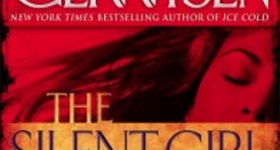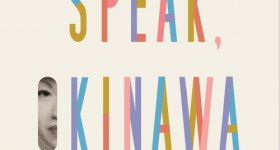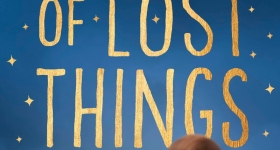Photo: Poet Srikanth Reddy and novelist Ed Lin exemplify the diversity in the Asian American writing community and at a recent Asian American literature symposium. Photo by Kira Wisniewski.
Eight amazing Asian American writers gathered at the University of Maryland this past Saturday to read their work and talk about the state of Asian American literature. Kira Wisniewski of 826DC was on the scene for Hyphen to report on the day-long festivities:
“We’ve already done our Asian American book for the year,” said Ed Lin, a participant of 8: A Symposium, sharing how a publisher responded to a friend of his whom recently submitted a manuscript.
In conjunction with the inaugural release of the Asian American Literary Review, co-editors Lawrence-Minh Bui Davis and Gerald Maa organized the event as part celebration and part awareness of some of the most exciting Asian American voices.
“This kind of event shines on the Asian American arts in particular, too often devalued, under-appreciated,” said Bui Davis. “[The writers] are from very different backgrounds, write about very different subjects, and have vastly different styles, but they also share certain things--geographies, thematic concerns, politics. A reading by any single one would be great, but the conversation between them, particularly given their eagerness to have that dialogue, is really exciting.”
Novelist Ru Freeman kicked off the event. Born in Colombo, Sri Lanka, Freeman’s debut novel A Disobedient Girl, has been translated into more than half a dozen languages. Before sharing an essay she recently penned, she talked about how she views the issue of Asian American writers facing the challenge of how to represent a continent and speak for its entirety. “I see it as a convenience rather than a burden. I don’t really take offence when I’m asked to answer on the behalf of ‘my people.’ I feel that that’s okay if it’s my job to speak and educate someone,” said Freeman.
Following Freeman was Peter Bacho. He read from his new young adult novel Leaving Yesler. He explains how the novel has a very powerful anti-war theme. His protagonist arrives in the form of Bobby, a mixed race teenager in the 1960s. When an audience member asked who is the audience he has in mind when writing, Bacho responded, “This is probably not good advice, but I picture myself as my audience.” For this project, he was able to pretend he was 15 years old again. He said that one of the joys of writing fiction is “creating a universe ... we get to control what everyone says and does.”
The soft-spoken Srikanth Reddy kicked off the second session with his potent poetry. When asked about the meaning behind the title of his latest collection Facts for Visitors Reddy responded, “At the time I was traveling a lot. The Lonely Planet [travel guide] books will have these five places to have lunch, but you realize there are actually a lot more than five places to eat in this town. So I thought of this collection of poetry like a guidebook." If you’re at the local book store you might have a hard time finding this collection of poetry immediately. “It always gets filed in the travel section of the bookstore which drives me crazy,” said Reddy.
In almost polar opposite demeanor of Reddy, Ed Lin took the stage and said to the crowd holding up the inaugural AALR issue “Looks good doesn’t it? You should always judge a journal by how it looks.” Lin started by reading a piece from the journal called “Chinese New Year” a light-hearted piece that mentions the idiosyncrasies that many have experienced at big family celebrations complete with the Shop Rite fruit cocktail in light syrup.
During the Q&A, an audience member asked Lin for advice to new writers and if he had a process when working with a piece that was constantly being tweaked. Lin responded, “If I ever have an impulse to add, I know I’m not done. Also, if I’m completely sick of something, that says something too.”
The juxtaposition of Reddy and Lin was on purpose. “There is such a wide range on everything -- style, content, genre, what they actually write. But also, you saw Ed and Srikanth, who are very polar opposite, but they’re having a conversation together. It’s very diverse, but there is a willingness to engage in dialogue with one another,” said Maa. “People who came to hear Srikanth read got to hear Ed read and vice versa. I think it’s important that it can be done.”
In the third session, poet April Naoko Heck took the podium first. As she approached the microphone she said “I went through like 1700 different things and versions of things I would say like I was accepting an Oscar or something but then I realized this isn’t about me this is a celebration of a journal and department at a school and especially in this economic climate, that they would back a new journal. I’m really honored to be part of that. I’m in such amazing company and I’m really humbled by that.” Her poetry falls into three arching themes -– her family, New York City and she jokingly says “my favorite obsession –- myself.”
Kyoko Mori took the stage next and shared sections from her book Yarn. Mori started with an amusing chapter about Midwest tendencies and a love/hate for Green Bay. During the Q&A she explains, “Even with my fiction when they are clearly people that are not myself –- they are. My first book was about a girl that kills herself, the girl in the end was nothing like me but she was like someone I knew growing up who had the same all or nothing attitude. What you know and what you imagine kind of collapse -- but in a good way.”
In the final session, Sonya Chung used the word “polyphonic” to describe her latest book Long for This World. Her work explores the connections between human rights and art through the tale of a Korean immigration and return. In response to a question from the audience if she had experience as a war photographer, she simply responded, “I made it up.” She went on to explain that her method is to write what she already knows, because that actually took her pretty far, and then she used research more to fact check in the end.
Karen Tei Yamashita closed out the event with a multi-media presentation on her new novel I Hotel that was just out that day. “On that table out there, I saw it for the first time; I’m really nervous.” The novel is based on the importance on the Asian American movement named after a hotel and community center in San Francisco. I Hotel is a novel written in 10 novellas. Peter Bacho returned to the stage to read a passage from Yamashita’s novel.
Closing remarks were made by Donna Hamilton, the Dean of Undergraduate Studies at the University of Maryland. “We’re so honored to have this extraordinary group of writers here,” said Hamilton. “What a wonderful thing is going on today.”
And what a wonderful day it was. Congrats to everyone involved with the event for showcasing dynamic writers. Will there be more?
“We have one in the plans for 2011 in LA. We'd like to put on one every year--but are open to more. Please contact us if you want to work together to make one happen in your area,” said Bui Davis.
If you’re interested in purchasing a copy of the journal, submitting contributions or bringing a similar symposium to your area, please visit their Web site at www.aalrmag.org.
- Kira Wisniewski









Comments
good catch, thanks! fixed.
want a job as a copyeditor??